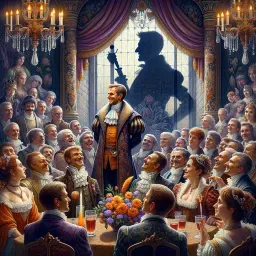If to do were as easy as to

0
0
0
0
- Meaning
- This phrase highlights the difference between knowing what is right or saying something and actually doing it. It speaks to the common human experience that, while it is often easy to identify the right course of action or to make plans, it is much more challenging to carry them out. Shakespeare uses metaphors like "chapels had been churches, and poor men's cottages princes' palaces" to illustrate that if good intentions were as simple to implement as they are to conceive, the world would be filled with grand achievements and full prosperity for all.
- Allegory
- This image uses a crossroads to represent choices and the decision-making process. The golden key signifies the potential to unlock success, while the open book represents knowledge and good intentions. The bridge with clouds and rain illustrates the effort and challenges one must face to turn intentions into actions. The palace symbolizes grand achievements and success, while the chapel and church in the background represent the difference between mere intentions and grand realizations. The color gradient from pastels to vivid hues mirrors the transition from passive ideas to active accomplishments.
- Applicability
- This phrase can be a useful reminder in everyday life, encouraging individuals to translate their good intentions and ideas into actionable plans. It can motivate one to bridge the gap between thought and action, emphasizing the importance of perseverance and effort in accomplishing goals.
- Impact
- The phrase underscores a timeless truth about human nature and has permeated various aspects of culture and thinking. It is often cited in discussions around ethics, personal growth, leadership, and self-improvement, attesting to the gap that frequently exists between ideals and actions. Shakespeare's work has profoundly impacted literature, theater, and broader cultural narratives globally.
- Historical Context
- "The Merchant of Venice" is believed to have been written between 1596 and 1599. This era falls into the late Elizabethan period, a time marked by the flourishing of English drama and literature, particularly influenced by the works of Shakespeare.
- Criticisms
- There is not much direct criticism or controversy surrounding this specific phrase. However, it’s possible to challenge its practicality, especially in a world that values quick results and immediate action over thoughtful planning and reflection. Some could argue that the emphasis should be on making actions easier to perform rather than simply highlighting their difficulty.
- Variations
- While there aren't widely recognized variations of this specific phrase, the sentiment it expresses is universal and can be found in many cultures. For example, a Chinese proverb states, "Talk does not cook rice," conveying a similar message that action is needed to achieve results.
-

To weep is to make less the depth of grief.
-

To do a great right do a little wrong.
-

know what were good to do, chapels had been churches, and poor men's cottages princes' palaces.
-

Labor omnia vincit.
-

Come, gentlemen, I hope we shall drink down all unkindness.
-

I am a man more sinned against than sinning.
-

Things without all remedy should be without regard: what's done is done.
-

To do a great right, do a little wrong.
-

There's daggers in men's smiles.
-

I must be cruel, only to be kind.
-

If to do were as easy as to know what were good to do, chapels had been churches, and poor men's cottages princes' palaces.
-

I am not bound to please thee with my answers.
No Comments